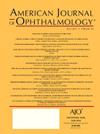Choriocapillaris in Age-Related Macular Degeneration: A Systematic Review of Optical Coherence Tomography Angiography–Based Assessments and Challenges in Standardization
IF 4.1
1区 医学
Q1 OPHTHALMOLOGY
引用次数: 0
Abstract
Topic
This systematic review evaluates the methodologies used for assessing the choriocapillaris (CC) in age-related macular degeneration (AMD) using optical coherence tomography angiography (OCTA). It focuses on identifying methodological heterogeneity in imaging and analysis protocols and its implications for clinical and research applications.
Clinical Relevance
AMD is a leading cause of vision loss, and assessing CC perfusion provides critical insights into its pathophysiology. OCTA has emerged as a noninvasive imaging technique offering high-resolution visualization of the CC. However, variability in methodologies has hindered the standardization of CC assessments. Establishing consistent practices is essential for improving clinical and research outcomes in AMD management.
Design
Systematic review.
Methods
Studies included in this review were selected on the basis of eligibility criteria defined by the Population, Intervention, Comparator, Outcome, Study design framework. Participants included patients with early, intermediate, and late AMD. Interventions involved the use of OCTA for CC assessment, with no restrictions on device type or scan parameters. Comprehensive searches of MEDLINE, Web of Science Core Collection, and the Cochrane Library were conducted up to November 30, 2024. Data extractions and narrative synthesis focused on device types, scan protocols, segmentation techniques, compensation strategies, and quantitative metrics.
Results
A total of 102 studies, encompassing 4047 patients with AMD and 4415 eyes, were analyzed. Fifty-two studies used spectral-domain OCTA, and 49 studies used swept-source OCTA, with significant heterogeneity in segmentation boundaries and slab thickness (4.4-30 µm). Only 32 studies used compensation strategies to address signal attenuation under drusen. Quantitative metrics varied widely, with CC flow deficit percentage being the most common. However, inconsistencies in thresholding methods and lack of standardized Phansalkar radius reporting limited comparability. The review highlights gaps in reporting segmentation boundaries and compensation techniques, which impact the ability to assess the reliability of findings.
Conclusions
This review underscores substantial variability in methodologies for CC assessment in AMD, highlighting the urgent need for standardized imaging protocols and analytical approaches. Despite advances in OCTA technology, inconsistencies in segmentation, thresholding, and compensation strategies challenge data reliability and reproducibility. Future research should prioritize methodological standardization to enhance comparability and clinical applicability.
AMD的绒毛膜毛细血管:基于octa的评估和标准化挑战的系统综述。
主题:本系统综述评估了使用光学相干断层扫描血管造影(OCTA)评估年龄相关性黄斑变性(AMD)中绒毛膜毛细血管(CC)的方法。它侧重于识别成像和分析方案的方法异质性及其对临床和研究应用的影响。临床相关性:AMD是视力丧失的主要原因,评估CC灌注提供了对其病理生理的重要见解。OCTA已成为一种非侵入性成像技术,可提供CC的高分辨率可视化。然而,方法的可变性阻碍了CC评估的标准化。建立一致的实践对于改善AMD管理的临床和研究成果至关重要。设计:系统回顾。方法:根据PICOS框架定义的资格标准选择纳入本综述的研究。参与者包括早期、中期和晚期AMD患者。干预措施包括使用OCTA进行CC评估,对设备类型或扫描参数没有限制。截止到2024年11月30日,对MEDLINE、Web of Science核心馆藏和Cochrane图书馆进行了综合检索。数据提取和叙述综合侧重于设备类型,扫描协议,分割技术,补偿策略和定量指标。结果:共分析了102项研究,包括4047名AMD患者和4415只眼睛。52项研究使用了光谱域OCTA, 49项研究使用了扫描源OCTA,在分割边界和板厚(4.4µm至30µm)方面存在显著的异质性。只有32项研究使用补偿策略来解决信号衰减。定量指标变化很大,CC流量亏缺百分比(CCFD%)是最常见的。然而,阈值方法的不一致性和缺乏标准化的潘萨尔半径报告限制了可比性。该综述强调了报告分割边界和补偿技术方面的差距,这些差距影响了评估研究结果可靠性的能力。结论:本综述强调了AMD中CC评估方法的巨大差异,强调了标准化成像方案和分析方法的迫切需要。尽管OCTA技术取得了进步,但分割、阈值和补偿策略的不一致性挑战了数据的可靠性和可重复性。未来的研究应注重方法学的标准化,以提高可比性和临床适用性。
本文章由计算机程序翻译,如有差异,请以英文原文为准。
求助全文
约1分钟内获得全文
求助全文
来源期刊
CiteScore
9.20
自引率
7.10%
发文量
406
审稿时长
36 days
期刊介绍:
The American Journal of Ophthalmology is a peer-reviewed, scientific publication that welcomes the submission of original, previously unpublished manuscripts directed to ophthalmologists and visual science specialists describing clinical investigations, clinical observations, and clinically relevant laboratory investigations. Published monthly since 1884, the full text of the American Journal of Ophthalmology and supplementary material are also presented online at www.AJO.com and on ScienceDirect.
The American Journal of Ophthalmology publishes Full-Length Articles, Perspectives, Editorials, Correspondences, Books Reports and Announcements. Brief Reports and Case Reports are no longer published. We recommend submitting Brief Reports and Case Reports to our companion publication, the American Journal of Ophthalmology Case Reports.
Manuscripts are accepted with the understanding that they have not been and will not be published elsewhere substantially in any format, and that there are no ethical problems with the content or data collection. Authors may be requested to produce the data upon which the manuscript is based and to answer expeditiously any questions about the manuscript or its authors.

 求助内容:
求助内容: 应助结果提醒方式:
应助结果提醒方式:


